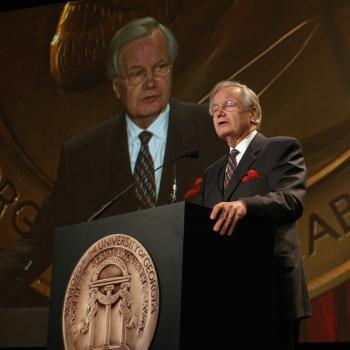
Black churches in America have played a pivotal role in the lives of African Americans since long before the Civil War began in 1861. As we celebrate Black History Month this February, I would like to look at how black churches have touched African Americans and impacted the nation as a whole.
Dr. Henry Louis Gates Jr. author of The Black Church: This Is Our Story, This Is Our Song and numerous other books, says that you have to understand the black church in order to understand America.
What does Gates mean?
The PBS American Experience documentary, “The Black Church,” says that black churches in America have “provided a safe haven for black Christians in a nation shadowed by the legacy of slavery and a society that remained defined by race and class” for more than 300 years.
That’s huge, but we need to look at specifics, which we will do shortly.
Terrence L. Johnson, an author and professor of African American religious studies at Harvard Divinity School, argues that the black church is not dead, despite “recent essays and articles highlighting the visible absence of African American clergy and churches from the Black Lives Matter (BLM) movement.”
What does Johnson say is happening with black churches in America today?
And finally, we will look at some of the Pew Research Center findings on how black churches are changing.
Hope, Spiritual Guidance & Social Support
Black churches have been the backbone of black communities for several centuries. The Portuguese introduced Catholicism to West Africa in the 1500s. And from that point, black slaves carried their Christian faith to the New World in the early 1600s, according to PBS.
Anglican ministers, and then Methodists and Baptists, spread Protestant Christianity to slaves in the American South. They stressed the Apostle Paul’s message, “Slaves, obey your masters,” which wasn’t a popular theme with the enslaved people.
A small number of white southerners shared the Christian faith with their slaves, and a few even allowed blacks to worship in white churches, although segregation was strictly enforced.
Methodists licensed black men to preach, and during the 1770s and 1780s, black ministers began to preach to other blacks, PBS said.
“No story spoke more powerfully to slaves than the story of Exodus, with the themes of bondage and liberation brought by a righteous and powerful God who would one day set them free.”
A Sense of Freedom
A few black ministers, such as a slave named Andrew Bryan, worked to establish black churches in the South. But many whites objected.
Bryan was arrested and whipped after preaching to a small group of slaves, but he persisted. His church – the First African Baptist Church in Savannah, Ga. – survived and grew, and two additional black churches were soon established in the community.
Churches not only nourished slaves’ spiritual hunger, but also provided a place where blacks felt a sense of freedom.
Henry Louis Gates Jr. explains that black churches “were the first institutions built by Black people and run independent of white society in the United States, with the earliest Black Christian congregations roughly contemporaneous with the Declaration of Independence of 1776, including churches in Georgia, South Carolina, and Virginia.”
These churches were the foundation of black people’s religious, economic, political and social lives. And as such, they were able to shine a light on the hypocrisy and evils of slavery.
Slavery Ends But….
In the mid-to-late-19th century, black churches in America…
- Supported slave rebellions and the Underground Railroad in the early-to-mid-19th century
- Honed blacks’ speaking skills for roles they would play during the abolitionist movement and Reconstruction era.
- Perhaps unknowingly prepared young black men to hold political office after the Civil War. I use the word “unknowingly” because few people could have predicted that black men would serve in the U.S. Congress after the war.
Three of the first 16 blacks who served in Congress during the post-war Reconstruction era were ministers. And “of the more than 2,000 Black officeholders at every level of government in that era, more than 240 were ministers – second only to farmers,” Henry Louis Gates notes.
Black Americans were no longer slaves, but many of the rights they gained after the war soon vanished. At the first opportunity, southerners and whites in a few other states passed laws to enforce segregation. These so-called Jim Crow laws remained on the books from the late 19th and early 20th centuries until 1965.
Civil Rights
In the 20th century, African American churches strongly supported civil rights by….
- Hosting large meetings, rallies and marches in support of civil rights.
- Providing spiritual, emotional moral and physical support to civil rights activists.
- Supporting black communities in various ways.
- Helping blacks gain job skills.
- Preparing blacks for leadership roles inside and outside the church.
- Producing civil rights leaders such as Rev. Martin Luther King Jr., the Rev. Ralph Abernathy, the Rev. Jesse Jackson and other ministers.
Black churches in the South were so instrumental in championing civil rights that dozens of them were designated historic landmarks.
Today’s Black Church in America
In this century, there are seven major black Protestant denominations in the U.S., according to the PBS American Experience documentary, “The Black Church.” They are the:
- National Baptist Convention
- National Baptist Convention of America
- Progressive National Convention
- African Methodist Episcopal Church
- African Methodist Episcopal Zion Church
- Christian Methodist Episcopal Church
- Church of God in Christ.
Even today, black churches help prepare men and women for secular leadership roles. The Rev. Raphael Warnock, pastor of the late Dr. Martin Luther King’s Atlanta church, is one of the latest examples of a minister being elected to Congress.
He is “the first African American ever sent to the Senate from his state (Georgia) and the eleventh Black American to be elevated to that chamber overall. The first was Hiram Revels, of Mississippi, in 1870…. And like Warnock, Revels had been a man of the Word,” Henry Louis Gates points out.
Two Stories of Tradition & Faith
“The traditions and faiths that fall under the umbrella of African American religion, particularly Christianity, constitute two stories,” according to Gates.
“One (is a story of) people defining themselves in the presence of a higher power and the other (tells) of their journey for freedom and equality in a land where power itself – and even humanity – for so long was and still is denied them.”
Black churches serve as a place of worship, a social center and “a cultural repository,” Gates explains. “…literally the place where ‘the faith of the fathers and mothers’ is summoned and preserved, modified and reinvented each Sunday, in a dynamic process of cultural retrieval and transformation, all at the same time.”
Many churches continue to provide social services such as meals for homeless people, housing for the elderly, childcare programs, prison ministries and programs for people with HIV or AIDS.
But black churches in America are changing. They are losing members – as are white churches – even though 80 percent of blacks maintain that religion is very important to them.
Nearly half say black churches have less influence than they had 50 years ago, but they believe black churches should have a greater role in society, according to Pew Research.
Is the Black Church Dead?
Some people would answer “Yes,” but professor and author Terrence L. Johnson says “No” and points out that the black church in America has always been a complicated religious institution.
“From its conception, clergy weaved together religion and politics to create thick and thin versions of liberation theology that many white clergy found objectionable or theologically unsound,” he says.
“It, too, was a place, especially during the Civil Rights Movement, where African American Muslims, Quakers, Universalists, and Humanists found a public space, a religious refuge, to reflect on the religious and political concerns of ordinary black folk, Christian and non-Christian alike.”
Johnson explains that some people claim the black church in America is dead because black clergy and black churches are notably absent from the Black Lives Matter (BLM) movement. But he points out that black churches in America:
- Are not and never have been monolithic.
- Continue to be morally and politically influential.
Yet, he admits that the church “has not lived up to its ideals in relationship to women, and the gay, lesbian and transgendered community.
“But the BLM movement, similar to the Black Power movement, is challenging the Black Church as well as its real and imaged communities to reexamine sexuality, gender, and class as it pushes the nation to overhaul the criminal justice system.”
Johnson believes Black Lives Matter is a natural extension of the black church’s commitment to “social transformation, liberation, and justice.”
Check Out These Sources
I’ll have to agree with Johnson that the black church in America is a complicated subject – in fact, it’s very complicated. The deeper you look into it, the more complicated it gets.
I’m proud of my skills as a researcher, but I’m no expert on black churches in America. But the following people and institutions are, and I hope you will see what they have to say.
- Henry Louis Gates Jr., “The Black Church”
- PBS American Experience, “The Black Church”
- Terrence L. Johnson, “Black Lives Matter and the Black Church”
- Pew Research Center, “A Brief Overview of Black Religious History in the U.S.”
- John Turner, whose article “Black Church, White Jesus” on Patheos is insightful and at times, humorous.













